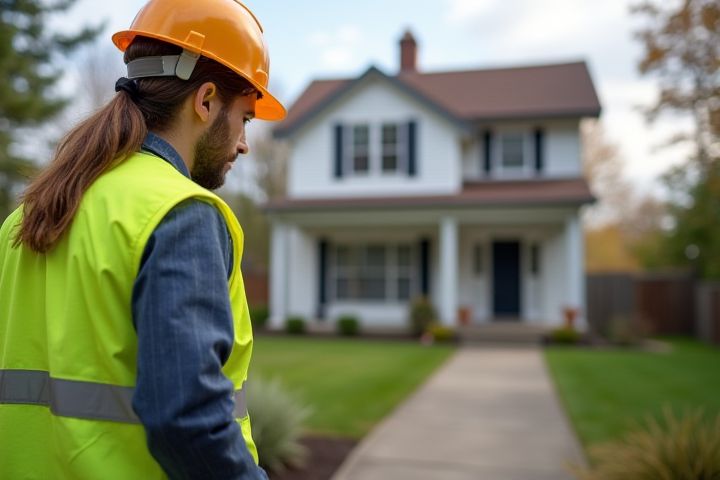
When selecting a house inspector, consider their qualifications, including certifications and licenses specific to your region. Look for inspectors with experience in residential properties and a strong reputation, often reflected in customer reviews and referrals from real estate agents. Ensure they provide a comprehensive report outlining safety, structural integrity, and potential maintenance issues, which is crucial for informed decision-making. Inquire about their inspection process, including what areas of the home will be evaluated and if they use advanced tools like thermal imaging. Lastly, ask about their insurance coverage to protect against any potential liabilities during the inspection.
How To Choose A House Inspector
Check Credentials
When selecting a house inspector, it's essential to thoroughly check their credentials to ensure you're hiring a qualified professional. Verify that the inspector holds relevant certifications from recognized organizations, such as the American Society of Home Inspectors (ASHI) or the National Association of Home Inspectors (NAHI). Assess their experience in the field by confirming the number of inspections they have conducted and looking for any testimonials or reviews from previous clients. You can also inquire about their adherence to local or state regulations, which can affect the quality and reliability of their inspections.
Verify Experience
When selecting a house inspector, prioritize verifying their experience by checking credentials and certifications, which indicate specialized training in home inspections. Look for professionals with a minimum of five years in the field, as this duration often correlates with a wealth of practical knowledge and familiarity with common issues. Reading online reviews from past clients can provide insights into the inspector's reliability and thoroughness in conducting assessments. For an even deeper evaluation, request sample inspection reports from potential inspectors to gauge the clarity and detail of their findings.
Look for References
When selecting a house inspector, prioritize gathering references from trusted sources, such as friends, family, or real estate agents. Inquire about their personal experiences to assess the inspector's expertise and reliability. Verify the inspector's qualifications, ensuring they are properly certified and licensed to perform the inspection. Reading online reviews can also provide insights into their professionalism and thoroughness, helping you make a well-informed decision.
View Sample Reports
When selecting a house inspector, prioritize reviewing sample reports to assess their thoroughness and clarity. A comprehensive report should include detailed evaluations of structural integrity, roofing, electrical systems, plumbing, and any potential pest issues. Look for inspectors who provide at least two to three sample reports from recent inspections, ideally reflecting various property types. Ensuring the inspector's report format meets your understanding can significantly impact your decision-making process.
Understand Costs
When selecting a house inspector, it's crucial to understand the costs involved in their services. Inspectors typically charge based on the size and age of the property, with average fees ranging from $300 to $500 for a standard inspection. You should also inquire about additional costs for specialized inspections, such as for mold, pests, or radon, which can significantly affect your overall budget. Remember to evaluate the inspector's experience and certifications as these factors can impact the quality of the inspection you receive, ultimately saving you money in potential repairs down the line.
Check for Licensing
When selecting a house inspector, it's crucial to verify their licensing to ensure they meet state and professional standards. Check your state's requirements for home inspectors, as some states mandate specific qualifications, such as completing a certain number of training hours or passing exams. Websites like the American Society of Home Inspectors (ASHI) or the National Association of Home Inspectors (NAHI) provide directories of certified inspectors, helping you find licensed professionals in your area. Always ask for proof of current licensing, as this demonstrates their commitment to ongoing education and adherence to industry regulations.
Evaluate Communication Skills
When selecting a house inspector, prioritize their communication skills as a vital criterion. Look for inspectors who provide clear, concise explanations and are willing to answer your questions thoroughly. During the initial contact, assess their responsiveness; a quick reply indicates reliability and professionalism. Remember, effective communication ensures you fully understand the property's condition, potential issues, and necessary repairs, ultimately aiding in informed decision-making.
Look for Insurance
When selecting a house inspector, prioritize those who hold valid professional liability insurance. This insurance protects you from potential claims arising from errors or omissions in their inspection. Verify the inspector's coverage amounts and make sure it meets state guidelines or industry standards. You can also ask for proof of insurance to ensure they are adequately protected, giving you peace of mind about your investment.
Assess Reputation
When assessing a house inspector's reputation, begin by checking online reviews on platforms like Google, Yelp, or Angie's List, where you can find feedback from previous clients regarding their experiences. Look for inspectors with an impressive track record, ideally with four stars or higher, ensuring that they have extensive experience, preferably over five years in the field. Don't hesitate to ask for references from past customers; contacting them can provide valuable insights into the inspector's thoroughness and reliability. Lastly, verify any certifications or memberships in professional organizations, which often indicate a commitment to maintaining high standards in the industry.
Confirm Service Coverage
When choosing a house inspector, confirm their service coverage by verifying the geographical areas they operate in. Many inspectors may specialize in specific regions, so it's essential to ensure they serve your locality, such as urban or rural settings. Look for those who are familiar with local building codes and specific environmental concerns, as this knowledge can significantly impact the inspection's thoroughness. You can also check their online reviews or ask for references to better understand their service quality in your area.
